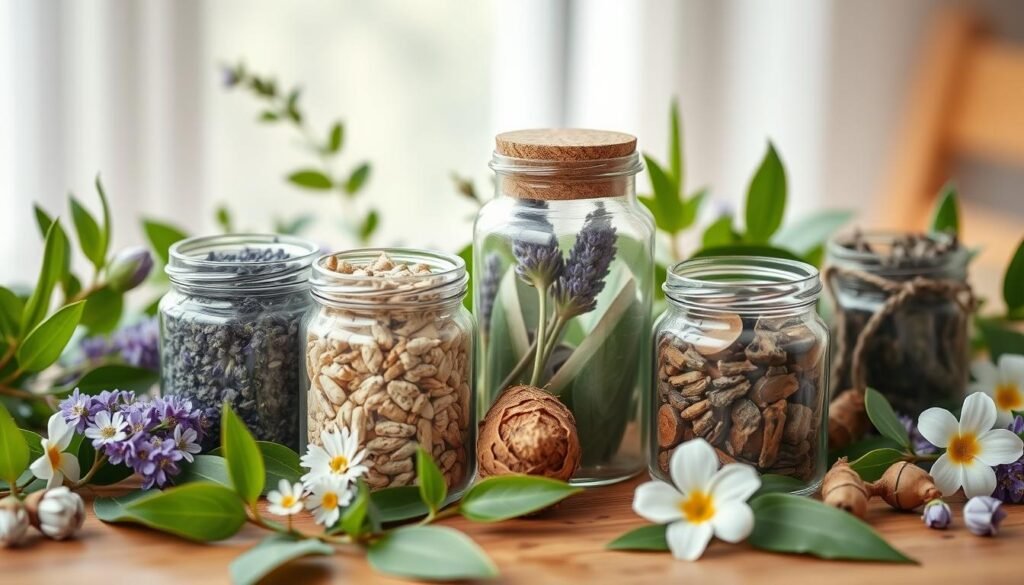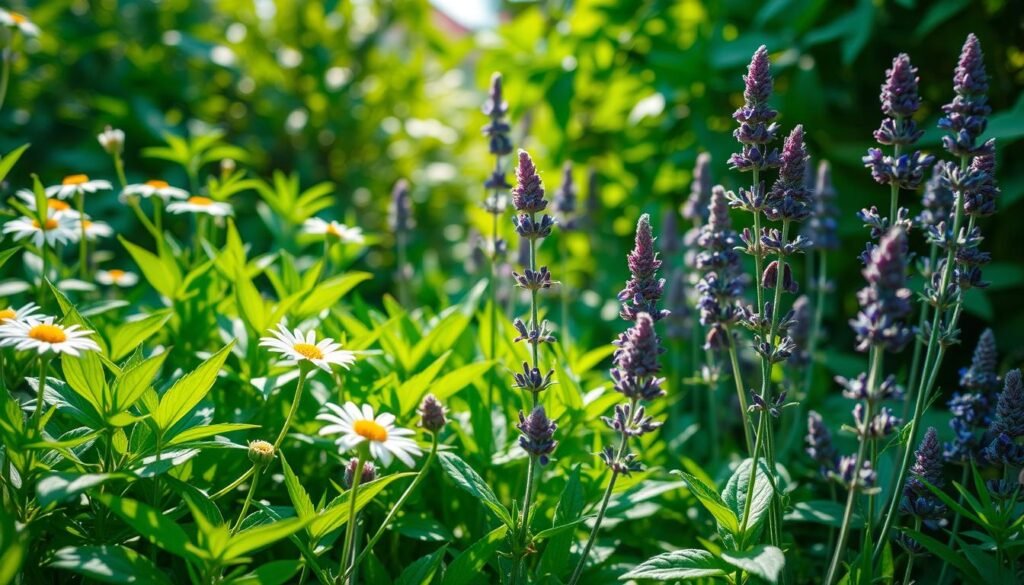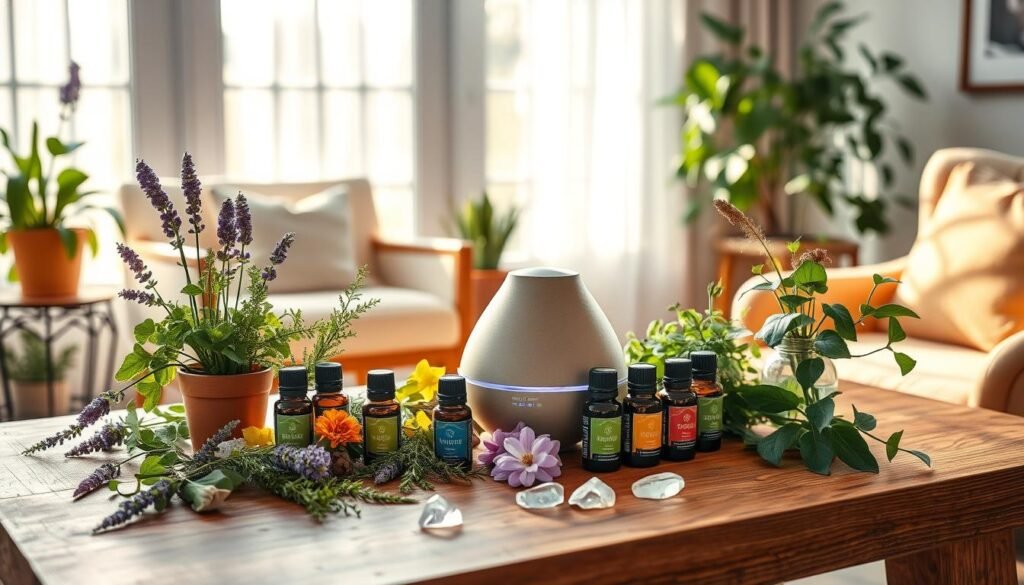About 6.8 million adults in the U.S. battle with Generalized Anxiety Disorder (GAD). Sadly, only 43.2% of them get help. This fact highlights the urgent need for more effective anxiety treatments. Now, more people are looking at natural ways to calm their anxiety. These natural solutions are emerging as strong contenders against traditional drugs.
Anxiety greatly affects a person’s life, from their wellbeing to how they interact with others. A little anxiety is normal, but when it’s always there, it can be overwhelming. The good news is, natural anxiety remedies are helping many. These remedies tend to have fewer negative side effects than standard treatments.
This article will share the best natural options for tackling anxiety. We’ll cover herbal supplements, essential oils, and changes you can make in your daily life. Learning about these options can help you take control of your mental health. It can reduce anxiety and improve your overall happiness.
Key Takeaways
- Nearly 7 million adults in the U.S. are affected by Generalized Anxiety Disorder.
- Natural remedies often provide relief with fewer side effects than prescription medications.
- Herbs like chamomile, lavender, and lemon balm can help reduce anxiety symptoms.
- Self-care access through over-the-counter medications enhances anxiety management.
- Natural anxiety treatments can promote balance without the risk of dependence.
Understanding Anxiety and Its Impacts
Anxiety is a natural response to stress. It keeps us alert and ready to face challenges. Although it can be helpful, too much anxiety leads to disorders that disrupt lives. In the United States, over 19% of adults battle anxiety disorders every year. This includes disorders like generalized anxiety, panic attacks, and social anxiety.
Anxiety affects both our minds and bodies deeply. Symptoms of anxiety include ongoing worry, obsessive thoughts, and trying to avoid things that scare us. These issues can stop people from doing normal activities. This makes their life quality go down even more.
Unchecked anxiety comes with big risks. Cognitive behavioral therapy (CBT) is a great way to tackle anxiety. It helps change behaviors and address symptoms. Some people also use dietary supplements for relief. But, these products are not always safe due to loose FDA regulations.
| Supplement | Effectiveness | Risks |
|---|---|---|
| Kava | Potential for anxiety reduction | Serious liver damage |
| Passion Flower | Limited evidence in studies | Compound effects may obscure benefits |
| Valerian | Mixed results | Long-term safety data lacking |
| Chamomile | Limited short-term effectiveness | Risk of increased bleeding |
| Lavender | Potential effectiveness | Constipation and upset stomach |
| Lemon Balm | May reduce worry and excitability | Insufficient safety data during pregnancy |
Treating symptoms of anxiety in different ways is key to better mental health. This includes therapy, changing our lifestyle, and sometimes trying herbal remedies. It’s important to understand anxiety fully. This way, people can find the help and treatment they need effectively.
The Role of Natural Remedies in Anxiety Management
More than 40 million Americans battle anxiety, making it a top mental health issue. Many people look for anxiety medication alternatives, turning to natural remedies. These options include herbal supplements, aromatherapy, and mindfulness techniques. They offer effective ways to ease anxiety and improve mental wellness.
Studies back the effectiveness of natural remedies in anxiety management. Lavender essential oil, for example, reduces anxiety without side effects or withdrawal. Kava, meanwhile, has shown strong results in easing anxiety, outperforming placebo treatments in studies. These findings suggest natural remedies could supplement traditional care.
Herbal remedies deserve special attention. Valerian root, similar to benzodiazepines, boosts GABA levels to lower anxiety. The supplement 5-HTP affects serotonin, aiding mood stability. Adding these to a treatment plan could improve results.
Mindfulness and meditation also greatly reduce anxiety symptoms. Such practices give people ways to handle their anxiety actively. Regular exercise contributes to better mental health. It complements natural remedies well.
Adding natural remedies to a holistic anxiety treatment might involve diet changes, too. Lack of magnesium, vitamin B6, and vitamin D can worsen anxiety. Eating foods rich in these nutrients can help manage anxiety levels.
Combining these approaches enhances traditional treatments. It also encourages people to actively improve their mental health naturally. This comprehensive method offers a fuller, more effective way to tackle anxiety.
| Natural Remedy | Benefits | Considerations |
|---|---|---|
| Lavender Oil | Reduces anxiety, improves sleep quality | No known side effects |
| Kava | Effective against anxiety, mild side effects | Short-term use recommended, potential liver toxicity |
| Valerian Root | Increases GABA, promotes relaxation | Mild, variable effects |
| 5-HTP | Increases serotonin, supports mood stabilization | Consult with a healthcare provider before use |
| Mindfulness Meditation | Significantly reduces anxiety symptoms | Requires regular practice for best results |
Exploring Herbal Supplements for Anxiety
Many people are turning to herbal supplements to help with anxiety. Research has shown that herbs like ashwagandha, chamomile, valerian, kava, passion flower, and lavender might help. They could be natural ways to find relief.
In 2019, a study looked at ashwagandha’s impact on anxiety. It involved 58 people taking 600 mg daily. They felt less stressed than those who didn’t take it. Another part found it lowered cortisol in the blood. Also, 60 people took 240 mg of ashwagandha for 60 days. They reported feeling less anxious.
Chamomile could also help with anxiety. A 2016 trial had 93 people take 1,500 mg daily for 12 weeks. It found they were less likely to fall back into severe anxiety. But, the evidence for valerian’s effect on anxiety isn’t strong, according to the NCCIH.
Kava has calming effects but could harm the liver. So, it’s crucial to talk to a doctor before trying it. Meanwhile, lavender oil might help with anxiety short-term. A 2017 review praised its calming ingredients, linalool and linalyl acetate.
A study with 278 people found that passion flower might help with anxiety. Also, a 2019 study suggested that CBD could calm the central nervous system. This might help people with anxiety. However, the FDA has yet to approve CBD.
Other options like magnesium, essential fatty acids, and vitamin C could also help with anxiety. They have potential benefits. But, always get advice from a healthcare provider before trying herbal supplements. They can have side effects or interact with medication.

Strongest Natural Anxiety Medication: An Overview
People looking for natural ways to fight anxiety have many options. Studies show some natural medications work well, offering an alternative to usual drugs. Kava, passionflower, and valerian root are top choices for easing anxiety. Each has its own way of working and different levels of success.
Top Herbal Options for Anxiety Relief
Kava stands out as a strong natural choice for anxiety. Many studies prove it can lower anxiety effectively. It’s great because it has fewer side effects and isn’t addictive compared to many drugs. You won’t feel withdrawal symptoms, but it’s best to drink less alcohol when taking kava.
Passionflower is gentler than kava, with not many side effects. It helps keep anxiety in check for lots of people, though results can vary. Valerian root is mainly for better sleep and relaxation. It might not fight anxiety directly but helps with sleep problems tied to anxiety.
Understanding Potential Side Effects
Knowing the side effects of herbal supplements is key to using them safely. Kava is mostly safe, but checking with health experts is wise, especially if you’re already taking other meds. Passionflower is liked for having few side effects. However, valerian root may make you tired, which could impact tasks like driving.
Some herbs, like St. John’s Wort, might not be proven for anxiety relief due to limited research. Relying solely on natural meds isn’t enough. Combining them with lifestyle changes and therapy could be more beneficial.

The Benefits of Aromatherapy
Aromatherapy is getting attention as a natural way to deal with anxiety. It’s all about using essential oils known for making you feel calm. More people are using essential oils for anxiety, showing they really help. You can use essential oils in many ways, making it easy to add them to your routine.
Essential Oils Known for Their Calming Effects
Some essential oils are famous for their ability to soothe. Lavender oil, for example, can ease anxiety. A study in 2017 showed it might even help before surgery. Bergamot orange oil is another good choice, proven to lessen anxiety in cases like surgery prep. Massage with Roman chamomile oil is also great for calming nerves.
- Lavender Oil: Renowned for its relaxing properties.
- Bergamot Orange Oil: Beneficial before surgical procedures.
- Roman Chamomile Oil: Effective when combined with massage.
- Clary Sage Oil: May lower pulse rates, indicating reduced anxiety.
- Neroli Oil: Found to decrease anxiety during labor.
- Rose Oil: Effective for preoperative anxiety.
Methods of Using Essential Oils
You can add essential oils to your daily life in many ways. Popular ways include:
- Using a diffuser to spread the oils in the air, which helps with relaxation.
- Putting oils on your skin, mixed with another oil to stop irritation.
- Smelling the oils right from the bottle or on a tissue.
- Adding oils to a warm bath for a calming effect.
These approaches let people use aromatherapy easily and effectively. It helps bring peace and wellness to your day.

| Essential Oil | Benefits | Usage Method |
|---|---|---|
| Lavender Oil | Reduces anxiety and promotes sleep | Diffusion, topical application |
| Bergamot Oil | Alleviates stress and anxiety | Inhalation, massage |
| Roman Chamomile Oil | Provides relaxation and reduces anxiety | Massage, topical application |
| Clary Sage Oil | May decrease heart rate and promote calmness | Inhalation, diffuser |
| Neroli Oil | Helps reduce anxiety during childbirth | Diffusion, massage |
| Rose Oil | Eases preoperative anxiety | Inhalation, topical application |
Effective Natural Anxiety Treatments
Millions in the United States deal with anxiety, with about 31.1% of adults affected at some point. There’s hope in natural anxiety treatments that avoid pharmaceutical side effects. Many alternative therapies offer various natural anxiety management strategies.
Herbal supplements like chamomile and ashwagandha help with anxiety. Chamomile can cut symptoms almost in half for some. Ashwagandha lowers stress hormones, which helps with stress and sleep.
Meditation is a key part of treating anxiety naturally. It works as well as some medicines in reducing anxiety. Deep breathing also helps, cutting anxiety by nearly 38% right after practice.
Changing your lifestyle can also make a big difference. Exercise can lower anxiety by 20-50%. Eating foods rich in magnesium also supports your mental health.
Calming methods like weighted blankets also help a lot. They can cut anxiety by up to 63%. Using a mix of these methods may offer the best relief.
Always talk to a doctor before trying new anxiety treatments. A personal plan is key to better mental health.
| Treatment Method | Effectiveness | Notes |
|---|---|---|
| Chamomile | Up to 50% reduction in GAD symptoms | Flavonoid apigenin engages GABA receptors |
| Ashwagandha | Lowers cortisol; improves sleep quality | Popular for stress relief |
| Mindfulness Meditation | Significant reduction in anxiety | Similar effectiveness to medication |
| Regular Exercise | Reduction of 20-50% in anxiety symptoms | 60% lower chance of developing anxiety |
| Weighted Blankets | Reduced anxiety by up to 63% | Provides a grounding sensation |
Complementary Lifestyle Changes for Anxiety Relief
Making lifestyle changes can greatly help with anxiety relief, improving our overall well-being. Certain habits, like regular physical activity, changing what we eat, and practicing mindfulness, can make a big difference in managing anxiety. These changes are a strong support for anyone dealing with anxiety.
Importance of Regular Exercise
Exercise plays a key role in tackling anxiety. It releases endorphins, which naturally make us feel better. According to the Anxiety and Depression Association of America, just five minutes of aerobic exercise can fight anxiety. And something as simple as a 10-minute brisk walk offers hours of relief.
Dietary Adjustments to Support Mental Health
Adjusting what we eat also supports mental health. A balanced diet, especially with omega-3 fatty acids and probiotics, is recommended. Research from 2021 shows that the right diet can help prevent and reduce anxiety symptoms. Drinking six to eight glasses of water a day is crucial for relaxation and health.
| Lifestyle Change | Benefits for Anxiety Relief |
|---|---|
| Regular Exercise | Boosts mood through endorphin release, improves sleep quality, and reduces anxiety symptoms. |
| Balanced Diet | Incorporating omega-3s and probiotics enhances mental health and supports anxiety management. |
| Hydration | Drinking enough water may lessen stress and promote overall well-being. |
| Avoiding Caffeine and Alcohol | Reduces triggers for anxiety, leading to a calmer state of mind. |
Adopting these lifestyle changes can greatly improve mental health. They support the journey towards managing anxiety better.
Other Popular Anxiety Relief Supplements
More and more, people are looking at natural ways to fight anxiety. This includes various supplements. Magnesium and omega-3 fatty acids are leading this trend, known for their positive impacts on mental health.
Including Magnesium and Omega-3 Fatty Acids
Magnesium is praised for helping calm the nervous system. Not having enough of it may lead to more anxiety and stress. Adding magnesium to what you eat or taking supplements could improve how you feel mentally. For example, a popular choice is the Natural Vitality Magnesium Supplement Drink Mix. It’s liked for its taste and how easy it is to use.
Omega-3 fatty acids are good for more than just heart health. They have shown potential in easing anxiety symptoms. Research indicates that taking omega-3s can assist in mood regulation and brain health. Eating fatty fish or flaxseeds, or taking omega-3 supplements, might help those looking for a natural way to manage anxiety.
However, it’s important to be cautious with supplements. The quality of herbal and dietary supplements can vary a lot. This is due to different standards in how they’re made. Always talk to a doctor before starting any supplement, especially if you’re already taking medication.
Conclusion
Managing anxiety well means understanding both natural remedies and lifestyle changes. Around 18.1% of people in America deal with anxiety disorders. This shows the need to explore natural ways to ease anxiety. Herbal options like St. John’s wort, passionflower, and kava can be quite helpful.
Even though herbal remedies can be effective, it’s important to find what works best for you. Since results can vary, talking to a healthcare professional is key. They can help figure out the best plan for you. People with anxiety should try integrating these natural solutions into their lives carefully.
Focusing on natural ways to reduce anxiety can really improve mental health. Finding the right natural remedy is a personal journey. But, it can be deeply rewarding.